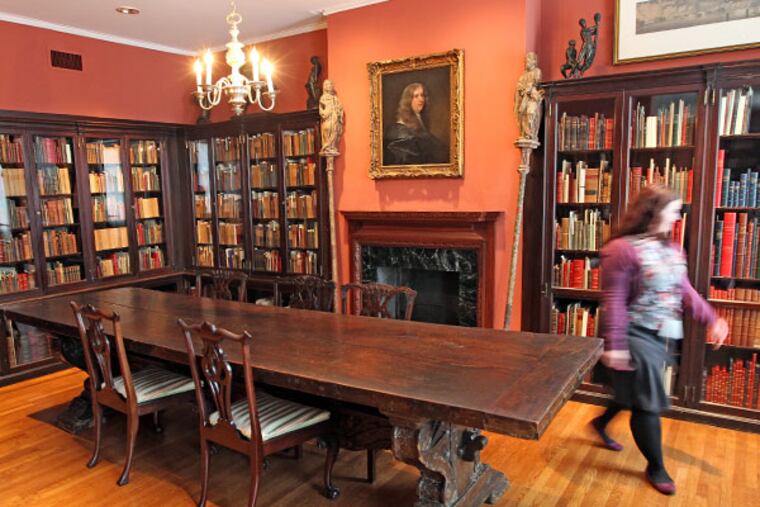Free Library completes acquisition of Rosenbach
Now it's the Rosenbach of the Free Library of Philadelphia. With the completion of a series of legal approvals, the Free Library's acquisition of the Rosenbach Museum and Library is done. The collection, housed in two townhouses at 20th Street and Delancey Place, was legally placed under the Free Library's authority as of Dec. 24, said Free Library lawyer Bruce K. Fenton.

PHILADELPHIA Now it's the Rosenbach of the Free Library of Philadelphia.
With the completion of a series of legal approvals, the Free Library's acquisition of the Rosenbach Museum and Library is done. The collection, housed in two townhouses at 20th Street and Delancey Place, was legally placed under the Free Library's authority as of Dec. 24, said Free Library lawyer Bruce K. Fenton.
The acquisition proceeded without contest. The state Attorney General's Office last month waived its right to a filing in the petition for approval, and Orphans' Court Judge John W. Herron on Dec. 17 gave his approval to the deal without scheduling a hearing.
The agreement states the intention for the Rosenbach to continue its separate corporate identity and retain ownership of its buildings, restricted endowment, and collection of about 410,000 rare books, manuscripts, and pieces of fine and decorative arts. But the Rosenbach now will be owned by a single member: the Free Library of Philadelphia Foundation.
The deal does not involve plans to remove or alter the collection assembled by book-dealer brothers A.S.W. and Philip Rosenbach. Language in the agreement stipulates that the Rosenbach will "continue to be organized and operated for the same charitable purposes for which it existed prior to the agreement." It does, however, give the library a free hand in organizing exhibitions, raising money, and generally stewarding the smaller institution.
Rosenbach director Derick Dreher will continue in his job, but now as a member of the library executive team, reporting to library president and director Siobhan Reardon. None of the Rosenbach's 14 employees will lose their jobs in the transaction, and their salaries will remain the same, Dreher said.
The board of the Rosenbach will be retained but will be augmented with three appointees by the library. Likewise, the library board will receive three Rosenbach members. The major governance change is that the Rosenbach board, though it will be consulted on operating matters, will no longer have fiduciary responsibility. The Free Library will manage investment of Rosenbach assets, raise the money, and keep the books.
A campaign to cover costs associated with the transition has raised $2.75 million of its $3 million goal, a library spokeswoman said Monday.
Operational savings are not expected, she said. The aim is to increase earned and contributed revenue, and find opportunities to marry items from both collections for exhibitions and programs.
The two staffs have been meeting to plan potential collaborative projects that take advantage of strengths in each library's collection - such as a 150th anniversary in 2015 of Lewis Carroll's Alice's Adventures in Wonderland that will draw items from both collections. "Our intention is to make every exhibition, whether here or there, a collaborative exhibition," Dreher said.
Reardon said the Free Library had no intention of ever moving the contents of the collection, selling the buildings, or changing in any way the Rosenbach experience.
"It is our complete intention to keep it as an experiential place," she said. "In libraryland now, we are moving very quickly and very strongly in thinking about libraries as transformational rather than transactional. The fact that the Rosenbach is that kind of place builds on that.
"You really do feel good when you leave there. There's an aura. I think that's the beauty of this. There's not a whole lot we have to do, other than maintain the brother-sister relationship under one umbrella."
Citing fund-raising difficulties, Rosenbach leaders broached the potential takeover in 2012, and discussions resulted in a letter of intent approved by both boards last April. Unlike the Barnes Foundation, whose founder attempted to control the fate of the collection through an indenture, the deed of trust left by Philip Hyman and Abraham Simon Wolf Rosenbach granted considerable freedom in managing the institution after their demises. Both died in the 1950s.
"If the trustees consider it better to house the collection belonging to the trust in an existing institution, they are authorized to do so," the deed stated. It further sanctioned trustees to "break up the collection and to make outright gifts of it, item by item, to any public library or libraries," or other organizations.